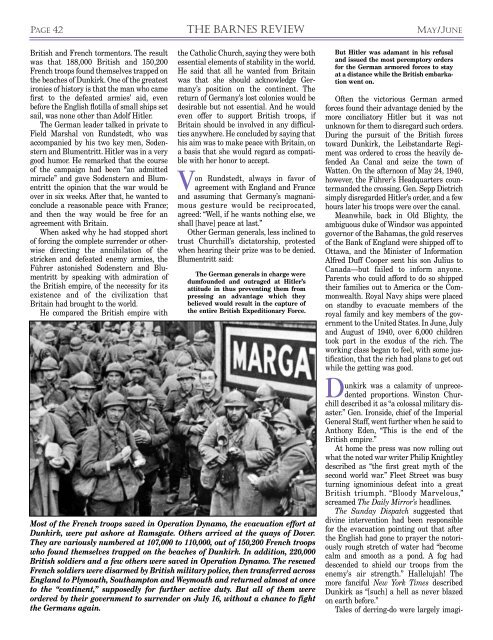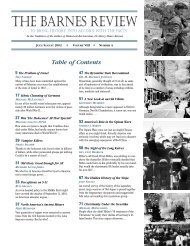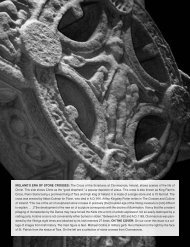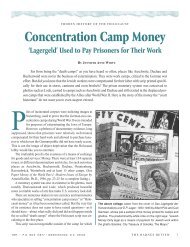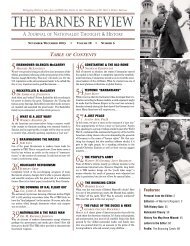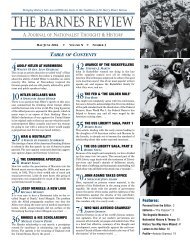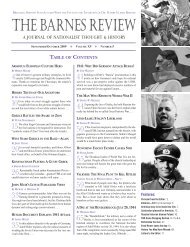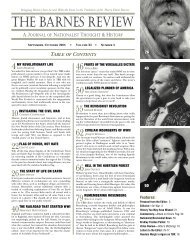Create successful ePaper yourself
Turn your PDF publications into a flip-book with our unique Google optimized e-Paper software.
PAGE 42 the barnes review MAY/JUNE<br />
British and French tormentors. <strong>The</strong> result<br />
was that 188,000 British and 150,200<br />
French troops found themselves trapped on<br />
the beaches of Dunkirk. One of the greatest<br />
ironies of history is that the man who came<br />
first to the defeated armies’ aid, even<br />
before the English flotilla of small ships set<br />
sail, was none other than Adolf Hitler.<br />
<strong>The</strong> German leader talked in private to<br />
Field Marshal von Rundstedt, who was<br />
accompanied by his two key men, Soden -<br />
stern and Blumentritt. Hitler was in a very<br />
good humor. He remarked that the course<br />
of the campaign had been “an admitted<br />
miracle” and gave Sodenstern and Blum -<br />
entritt the opinion that the war would be<br />
over in six weeks. After that, he wanted to<br />
conclude a reasonable peace with France;<br />
and then the way would be free for an<br />
agreement with Britain.<br />
When asked why he had stopped short<br />
of forcing the complete surrender or otherwise<br />
directing the annihilation of the<br />
stricken and defeated enemy armies, the<br />
Führer astonished Sodenstern and Blu -<br />
men tritt by speaking with admiration of<br />
the British empire, of the necessity for its<br />
existence and of the civilization that<br />
Britain had brought to the world.<br />
He compared the British empire with<br />
the Catholic Church, saying they were both<br />
essential elements of stability in the world.<br />
He said that all he wanted from Britain<br />
was that she should acknowledge Ger -<br />
many’s position on the continent. <strong>The</strong><br />
return of Germany’s lost colonies would be<br />
desirable but not essential. And he would<br />
even offer to support British troops, if<br />
Britain should be involved in any difficulties<br />
anywhere. He concluded by saying that<br />
his aim was to make peace with Britain, on<br />
a basis that she would regard as compatible<br />
with her honor to accept.<br />
Von Rundstedt, always in favor of<br />
agree ment with England and France<br />
and assuming that Germany’s magnanimous<br />
gesture would be reciprocated,<br />
agreed: “Well, if he wants nothing else, we<br />
shall [have] peace at last.”<br />
Other German generals, less inclined to<br />
trust Churchill’s dictatorship, protested<br />
when hearing their prize was to be denied.<br />
Blumentritt said:<br />
<strong>The</strong> German generals in charge were<br />
dumfounded and outraged at Hitler’s<br />
attitude in thus preventing them from<br />
pressing an advantage which they<br />
believed would result in the capture of<br />
the entire British Expeditionary Force.<br />
Most of the French troops saved in Operation Dynamo, the evacuation effort at<br />
Dunkirk, were put ashore at Ramsgate. Others arrived at the quays of Dover.<br />
<strong>The</strong>y are variously numbered at 107,000 to 110,000, out of 150,200 French troops<br />
who found themselves trapped on the beaches of Dunkirk. In addition, 220,000<br />
British soldiers and a few others were saved in Operation Dynamo. <strong>The</strong> rescued<br />
French soldiers were disarmed by British military police, then transferred across<br />
England to Plymouth, Southampton and Weymouth and returned almost at once<br />
to the “continent,” supposedly for further active duty. But all of them were<br />
ordered by their government to surrender on July 16, without a chance to fight<br />
the Germans again.<br />
But Hitler was adamant in his refusal<br />
and issued the most peremptory orders<br />
for the German armored forces to stay<br />
at a distance while the British embarkation<br />
went on.<br />
Often the victorious German armed<br />
forces found their advantage denied by the<br />
more conciliatory Hitler but it was not<br />
unknown for them to disregard such or ders.<br />
During the pursuit of the British forces<br />
toward Dunkirk, the Leibstandarte Regi -<br />
ment was ordered to cross the heavily de -<br />
fended Aa Canal and seize the town of<br />
Watten. On the afternoon of May 24, 1940,<br />
however, the Führer’s Headquarters countermanded<br />
the crossing. Gen. Sepp Die trich<br />
simply disregarded Hitler’s order, and a few<br />
hours later his troops were over the canal.<br />
Meanwhile, back in Old Blighty, the<br />
ambiguous duke of Windsor was appointed<br />
governor of the Bahamas, the gold reserves<br />
of the Bank of England were shipped off to<br />
Ottawa, and the Minister of Information<br />
Alfred Duff Cooper sent his son Julius to<br />
Canada—but failed to inform anyone.<br />
Parents who could afford to do so shipped<br />
their families out to America or the Com -<br />
monwealth. Royal Navy ships were placed<br />
on standby to evacuate members of the<br />
royal family and key members of the government<br />
to the United States. In June, July<br />
and August of 1940, over 6,000 children<br />
took part in the exodus of the rich. <strong>The</strong><br />
working class began to feel, with some justification,<br />
that the rich had plans to get out<br />
while the getting was good.<br />
Dunkirk was a calamity of unprecedented<br />
proportions. Winston Chur -<br />
chill de scribed it as “a colossal military disaster.”<br />
Gen. Ironside, chief of the Imperial<br />
General Staff, went further when he said to<br />
Anthony Eden, “This is the end of the<br />
British empire.”<br />
At home the press was now rolling out<br />
what the noted war writer Philip Knight ley<br />
described as “the first great myth of the<br />
second world war.” Fleet Street was busy<br />
turning ignominious de feat into a great<br />
British triumph. “Bloody Marvelous,”<br />
screamed <strong>The</strong> Daily Mirror’s headlines.<br />
<strong>The</strong> Sunday Dispatch suggested that<br />
divine intervention had been responsible<br />
for the evacuation pointing out that after<br />
the English had gone to prayer the notoriously<br />
rough stretch of water had “become<br />
calm and smooth as a pond. A fog had<br />
descended to shield our troops from the<br />
enemy’s air strength.” Hallelujah! <strong>The</strong><br />
more fanciful New York Times described<br />
Dunkirk as “[such] a hell as never blazed<br />
on earth before.”<br />
Tales of derring-do were largely imagi-


